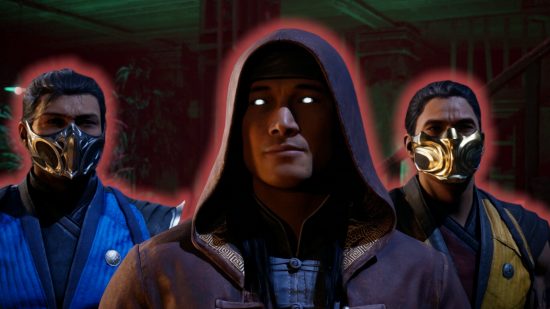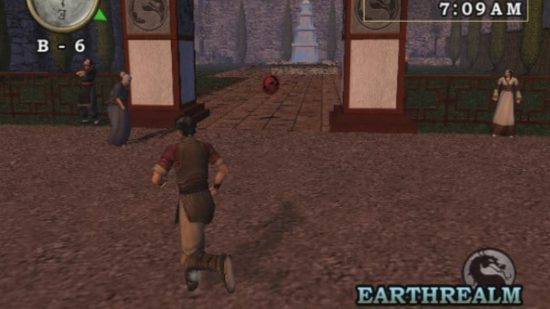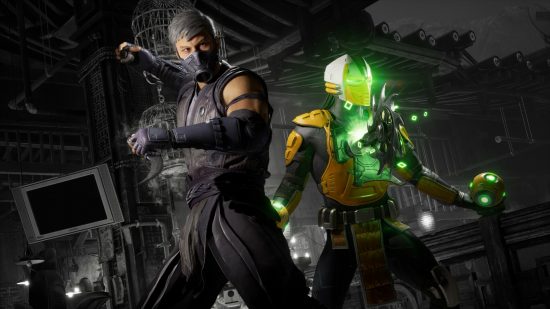Mortal Kombat 1 is now out in the wild and garnering praise from fighting games veterans and casual players alike. Among all the new features, Mortal Kombat 1 Invasions might be the meatiest, and while the mode’s live service promises seem like a good fit for both casual and competitive players looking to level up their skills, I think MK1 – and its all-important timeline reset – would have benefitted from a return to the excellent, long-lost Konquest Mode instead.
For those unfamiliar with the PS2-era Mortal Kombat entries, Konquest was essentially a third-person, story-driven adventure mode that took players across several realms and allowed them to interact with the Mortal Kombat world and its characters in a variety of ways. While the gameplay varied between games and preserved the gruesome fights at the center of the Mortal Kombat experience, Konquest felt unlike anything we’d ever seen in other fighting games.
Konquest in 2002’s Mortal Kombat: Deadly Alliance was barely an adventure, as only videos of a monk moving between locations and texts simulated a journey from one mission to the next. While Konquest still dealt with every character in the game and created some sense of overarching narrative, it wasn’t until Mortal Kombat: Deception two years later that Konquest mode reached its full PS2-era potential.
Deception’s take on Konquest, if played today, feels (and plays) like a look into our present, as the structure was drastically changed from traditional missions into a full-blown RPG adventure with large environments that could be freely explored, tons of side content, and even quests and events tied to the time of day. It’d have been a strong third-person adventure on its own, but it was only a part of Deception’s memorable full package.

Later came Armageddon, the last of the PS2-era Mortal Kombat games, which stripped down the RPG features of the previous mode and instead became a more bombastic and linear action-heavy adventure. While that iteration of Konquest was miles ahead of what Deadly Alliance did, it felt like a step down from Deception’s bold exploration of the Mortal Kombat universe.
Diehard fanatics of fighting games also surely remember Tekken’s own adventure-like modes, which also evolved over the years before disappearing in favor of alternative competitive modes to play the game. In the long run, most fighting game franchises have opted to embrace the “tournament crowd” and double down on their strengths. It’s hard to blame the developers and publishers for doing so, but I believe that something special has been lost along the way. Fighting games used to be zanier and more playful, and the fact Street Fighter 6 brought back some of that energy with World Tour earlier this year filled my heart with joy.
Once you wrap up Mortal Kombat 1’s strong-as-usual Story mode, you’re left with two options if you’re more of a solo player: Towers and Invasions. Honestly, you can’t go wrong with the first one if all you need are increasingly difficult brawls, an excuse to level up the entire roster of Mortal Kombat 1 characters, and a chance to experiment with the many MK1 Kameo fighters. MK1 Invasions, however, mostly feels like Warner Bros. Games’ attempt at farming that sweet player engagement, despite all of the mode’s neat tricks and cool scenarios. The previous game in the series, Mortal Kombat 11, already featured some half-cooked live service elements, and while the strong financial numbers support those decisions, many long-time players didn’t quite vibe with the ugly layer of monetization slapped on top of an otherwise hugely satisfying traditional title.
Don’t get me wrong, having an MK1 mode that presents itself as a board game of sorts is pretty sweet, but at the end of the day, you’ll be mostly pushing through several fights with modifiers – and that’s it. There’s always the promise of more and better content with each of the planned seasons, but that also sounds an awful lot like the cookie-cutter, drip-fed content we’ve endured in other titles – no matter the genre – with underbaked live service aspirations.
Almost two decades ago, Mortal Kombat Deception perfected a mode that not only championed Mortal Kombat’s deep and excellent universe, but that could rival some of the best RPG offerings of the time. With Mortal Kombat 1 priding itself on being a timeline reset that re-writes the lore books, it feels like Konquest would’ve been the perfect experience to revisit and emulate. Looking at NetherRealm’s ongoing narrative efforts and all the love open-world games are currently enjoying across all platforms, I’d have taken a resurrection of Konquest over Invasions any day.
At the end of the day, Mortal Kombat 1 seems to be a game squarely made for the more competitive followers of the blood-soaked series, and seeing as the core gameplay and the gory presentation remain so freakin’ good, that’s all good. But I can’t help but feel disappointed with the continued reduction of the silly, quirky, alternative content in these games in favor of safer and more market-tested offerings. Mortal Kombat once was the ‘weird cousin’ of fighting games – a total wildcard. Nowadays, it feels more like a family member with murderous impulses.


